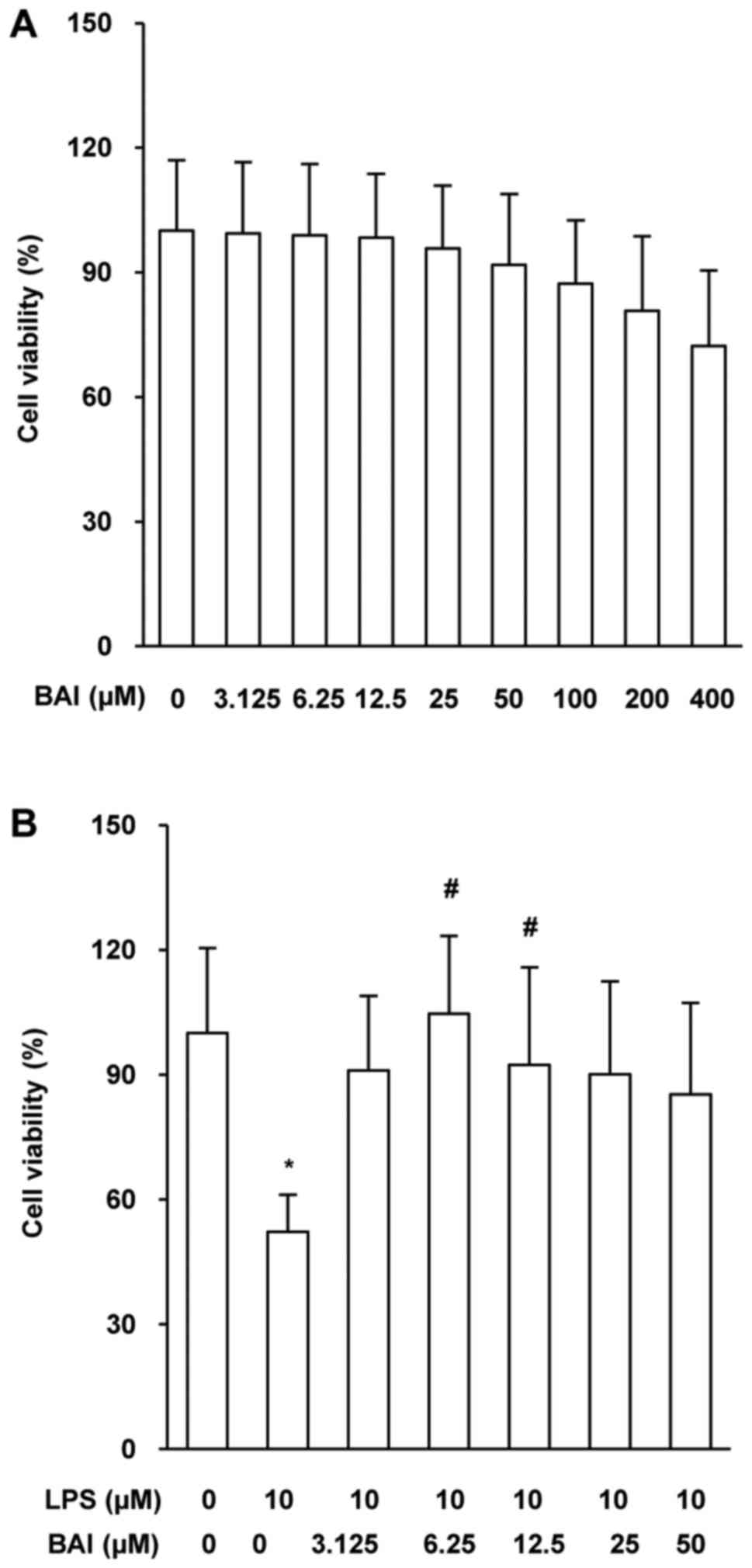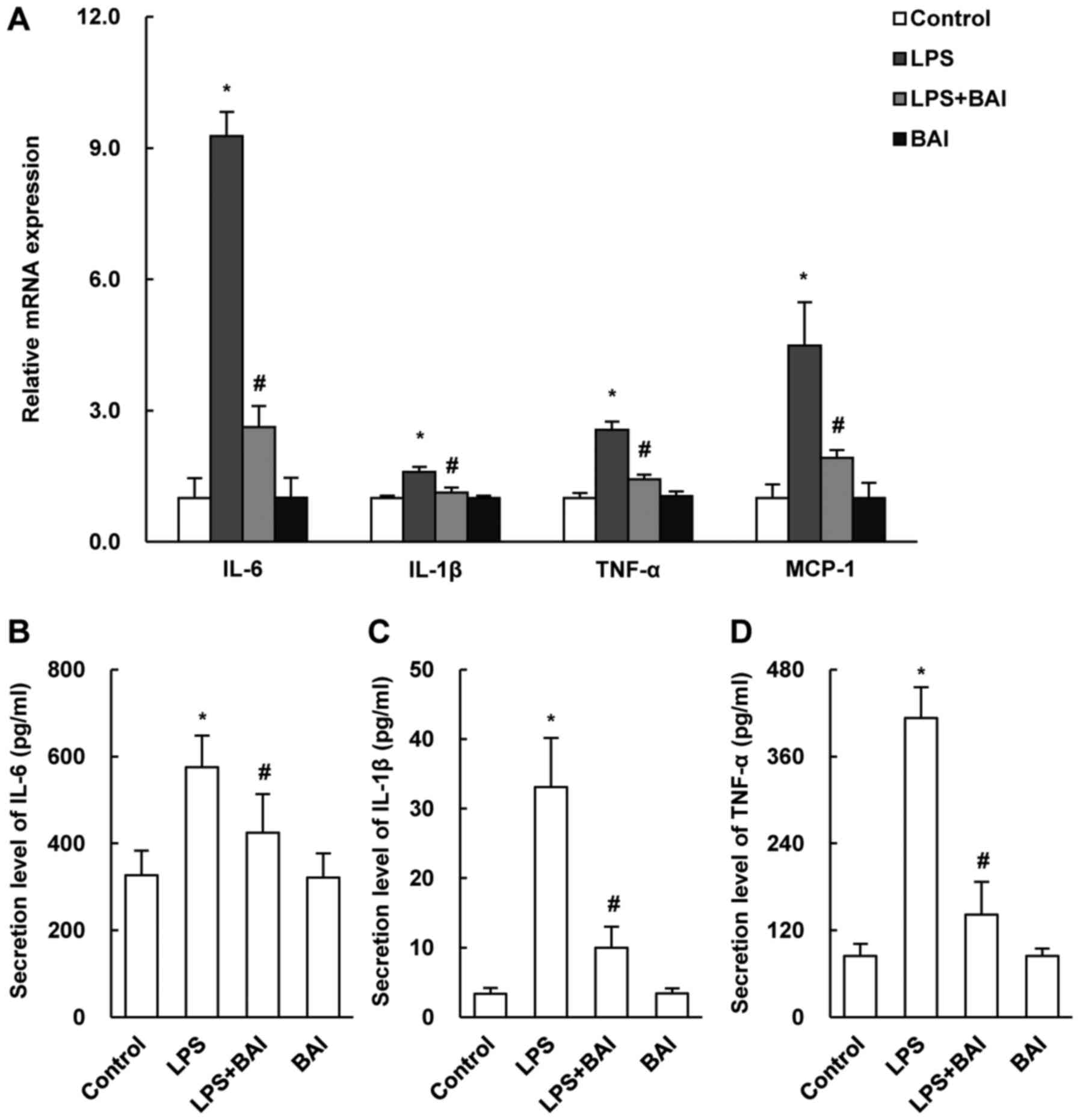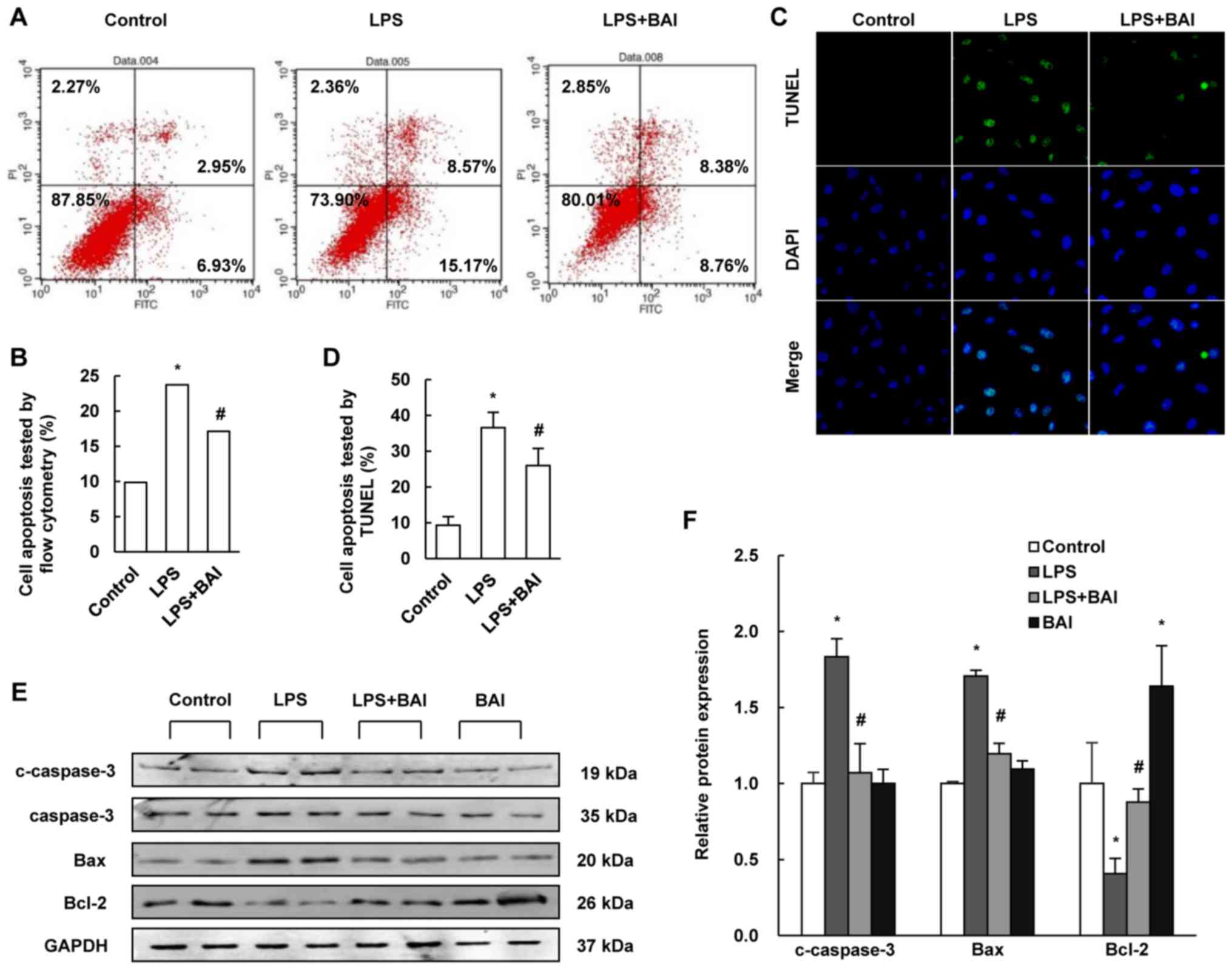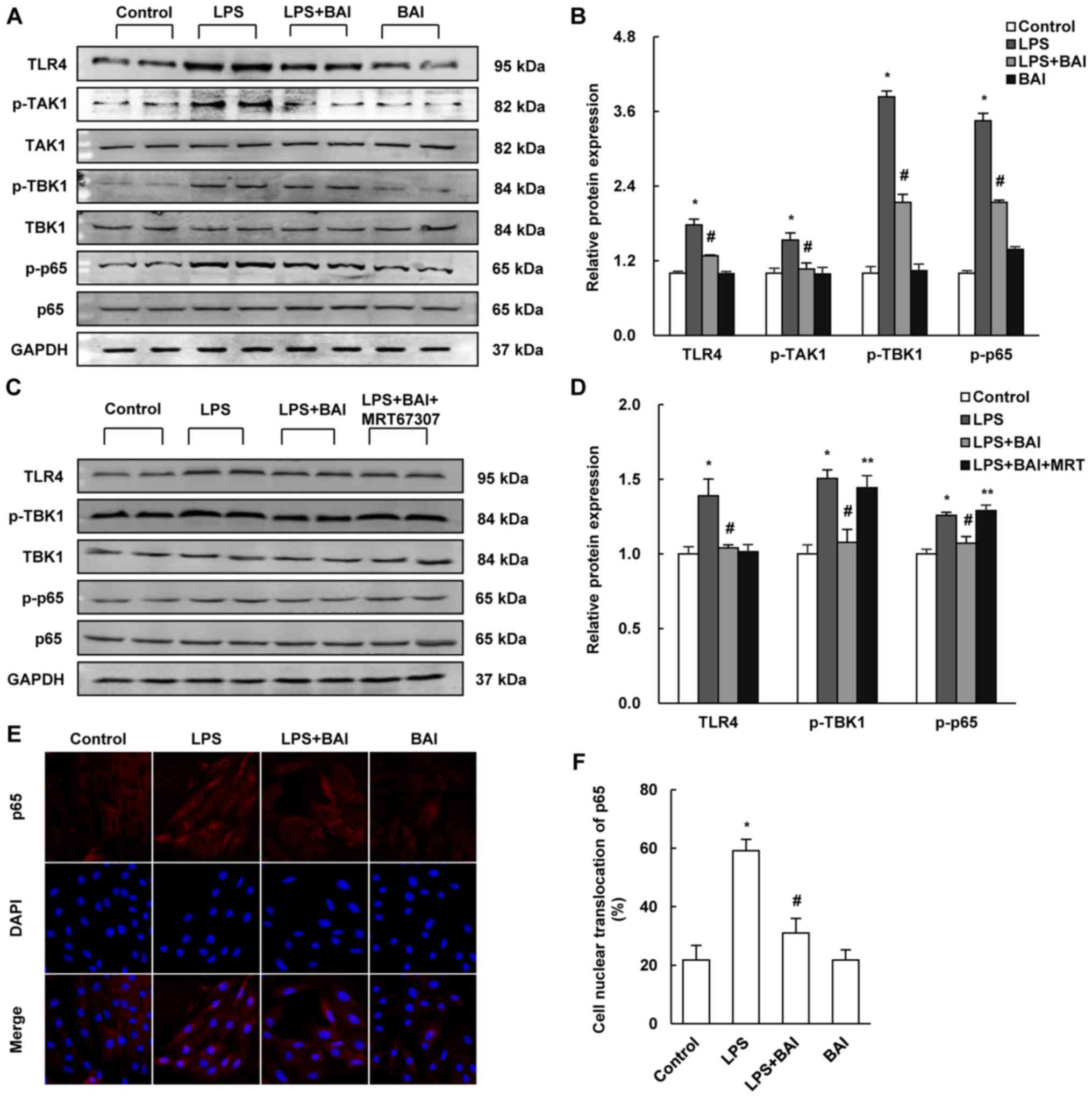|
1
|
McCarron JG, Lee MD and Wilson C: The
endothelium solves problems that endothelial cells do not know
exist. Trends Pharmacol Sci. 38:322–338. 2017. View Article : Google Scholar : PubMed/NCBI
|
|
2
|
Fraisl P, Mazzone M, Schmidt T and
Carmeliet P: Regulation of angiogenesis by oxygen and metabolism.
Dev Cell. 16:167–179. 2009. View Article : Google Scholar : PubMed/NCBI
|
|
3
|
Wei F, Liu S, Luo L, Gu N, Zeng Y, Chen X,
Xu S and Zhang D: Anti-inflammatory mechanism of ulinastatin:
Inhibiting the hyperpermeability of vascular endothelial cells
induced by TNF-α via the RhoA/ROCK signal pathway. Int
Immunopharmacol. 46:220–227. 2017. View Article : Google Scholar : PubMed/NCBI
|
|
4
|
Jang J, Jung Y, Kim Y, Jho EH and Yoon Y:
LPS-induced inflammatory response is suppressed by Wnt inhibitors,
Dickkopf-1 and LGK974. Sci Rep. 7:416122017. View Article : Google Scholar : PubMed/NCBI
|
|
5
|
Yu X, Lan P, Hou X, Han Q, Lu N, Li T,
Jiao C, Zhang J, Zhang C and Tian Z: HBV inhibits LPS-induced NLRP3
inflammasome activation and IL-1β production via suppressing the
NF-κB pathway and ROS production. J Hepatol. 66:693–702. 2017.
View Article : Google Scholar : PubMed/NCBI
|
|
6
|
Peng T, Lu X, Lei M, Moe GW and Feng Q:
Inhibition of p38 MAPK decreases myocardial TNF-alpha expression
and improves myocardial function and survival in endotoxemia.
Cardiovasc Res. 59:893–900. 2003. View Article : Google Scholar : PubMed/NCBI
|
|
7
|
Ives A, Nomura J, Martinon F, Roger T,
LeRoy D, Miner JN, Simon G, Busso N and So A: Xanthine
oxidoreductase regulates macrophage IL-1β secretion upon NLRP3
inflammasome activation. Nat Commun. 6:65552015. View Article : Google Scholar : PubMed/NCBI
|
|
8
|
Kim SD, Lee YJ, Baik JS, Han JY, Lee CG,
Heo K, Park YS, Kim JS, Ji HD, Park SI, et al: Baicalein inhibits
agonist- and tumor cell-induced platelet aggregation while
suppressing pulmonary tumor metastasis via cAMP-mediated VASP
phosphorylation along with impaired MAPKs and PI3K-Akt activation.
Biochem Pharmacol. 92:251–265. 2014. View Article : Google Scholar : PubMed/NCBI
|
|
9
|
Wang Y, Han E, Xing Q, Yan J, Arrington A,
Wang C, Tully D, Kowolik CM, Lu DM, Frankel PH, et al: Baicalein
upregulates DDIT4 expression which mediates mTOR inhibition and
growth inhibition in cancer cells. Cancer Lett. 358:170–179. 2015.
View Article : Google Scholar : PubMed/NCBI
|
|
10
|
Cai W, Fu Y, Zhang W, Chen X, Zhao J, Song
W, Li Y, Huang Y, Wu Z, Sun R, et al: Synergistic effects of
baicalein with cefotaxime against Klebsiella pneumoniae through
inhibiting CTX-M-1 gene expression. BMC Microbiol. 16:1812016.
View Article : Google Scholar : PubMed/NCBI
|
|
11
|
Tsai KL, Hung CH, Chan SH, Shih JY, Cheng
YH, Tsai YJ, Lin HC and Chu PM: Baicalein protects against
oxLDL-caused oxidative stress and inflammation by modulation of
AMPK-alpha. Oncotarget. 7:72458–72468. 2016.PubMed/NCBI
|
|
12
|
Huang Y, Miao Z, Hu Y, Yuan Y, Zhou Y, Wei
L, Zhao K, Guo Q and Lu N: Baicalein reduces angiogenesis in the
inflammatory microenvironment via inhibiting the expression of
AP-1. Oncotarget. 8:883–899. 2017.PubMed/NCBI
|
|
13
|
Zong J, Zhang DP, Zhou H, Bian ZY, Deng W,
Dai J, Yuan Y, Gan HW, Guo HP and Tang QZ: Baicalein protects
against cardiac hypertrophy through blocking MEK-ERK1/2 signaling.
J Cell Biochem. 114:1058–1065. 2013. View Article : Google Scholar : PubMed/NCBI
|
|
14
|
Zheng K, Setyawati MI, Lim TP, Leong DT
and Xie J: Antimicrobial cluster bombs: Silver nanoclusters packed
with daptomycin. ACS Nano. 10:7934–7942. 2016. View Article : Google Scholar : PubMed/NCBI
|
|
15
|
Grasl-Kraupp B, Ruttkay-Nedecky B,
Koudelka H, Bukowska K, Bursch W and Schulte-Hermann R: In situ
detection of fragmented DNA (TUNEL assay) fails to discriminate
among apoptosis, necrosis, and autolytic cell death: A cautionary
note. Hepatology. 21:1465–1468. 1995. View Article : Google Scholar : PubMed/NCBI
|
|
16
|
Burchfield JS, Xie M and Hill JA:
Pathological ventricular remodeling: Mechanisms: Part 1 of 2.
Circulation. 128:388–400. 2013. View Article : Google Scholar : PubMed/NCBI
|
|
17
|
Heim A, Zeuke S, Weiss S, Ruschewski W and
Grumbach IM: Transient induction of cytokine production in human
myocardial fibroblasts by coxsackievirus B3. Circ Res. 86:753–759.
2000. View Article : Google Scholar : PubMed/NCBI
|
|
18
|
Pober JS and Sessa WC: Evolving functions
of endothelial cells in inflammation. Nat Rev Immunol. 7:803–815.
2007. View
Article : Google Scholar : PubMed/NCBI
|
|
19
|
Sahu BD, Mahesh Kumar J and Sistla R:
Baicalein, a bioflavonoid, prevents cisplatin-induced acute kidney
injury by up-regulating antioxidant defenses and down-regulating
the MAPKs and NF-κB pathways. PLoS One. 10:e1341392015. View Article : Google Scholar
|
|
20
|
Chen S, Yang Y, Feng H, Wang H, Zhao R and
Liu H: Baicalein inhibits interleukin-1-induced proliferation of
human rheumatoid arthritis fibroblast-like synoviocytes.
Inflammation. 37:163–169. 2014. View Article : Google Scholar : PubMed/NCBI
|
|
21
|
Wang CX, Xie GB, Zhou CH, Zhang XS, Li T,
Xu JG, Li N, Ding K, Hang CH, Shi JX and Zhou ML: Baincalein
alleviates early brain injury after experimental subarachnoid
hemorrhage in rats: Possible involvement of TLR4/NF-κB-mediated
inflammatory pathway. Brain Res. 1594:245–255. 2015. View Article : Google Scholar : PubMed/NCBI
|
|
22
|
Clark K, Peggie M, Plater L, Sorcek RJ,
Young ER, Madwed JB, Hough J, McIver EG and Cohen P: Novel
cross-talk within the IKK family controls innate immunity. Biochem
J. 434:93–104. 2011. View Article : Google Scholar : PubMed/NCBI
|


















